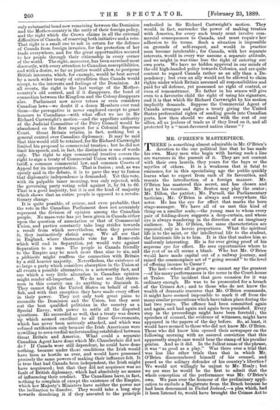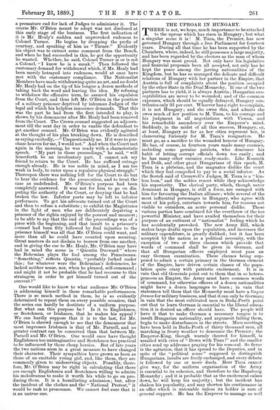MR. O'BRIEN'S MASTERPIECE.
THERE is something almost admirable in Mr. O'Brien's devotion to the one political line that he has made his own. Many men who begin with having such a line are waverers in the pursuit of it. They are not content with their own laurels, they yearn for the bays or the myrtles of others. It is a weakness that is fatal to eminence, for in this specialising age the public quickly learns what to expect from each of its favourites, and resents the introduction of a foreign manner. Mr. O'Brien has mastered this secret, and has chosen and kept to his vocation. Mr. Sexton may play the orator; Mr. Dillon, the patriot ; Mr. Parnell, the Parliamentary tactician ; Mr. O'Brien is always and everywhere the actor. He has the eye for effect that marks the born stage-manager. We have all of us met this kind of thing on a smaller scale,—the young man to whom every pair of folding-doors suggests a drop-curtain, and whose eye is always wandering in the direction of an imaginary audience. In Mr. O'Brien, the same characteristics are repeated, only in heroic proportions. What the spiritual life is to the saint, or the intellectual life to the student, the histrionic life is to him. It is this that makes him so uniformly interesting. He is for ever giving proof of his supreme eye for effect. He sees opportunities where to the rest of us all seems a blank. Who but Mr. O'Brien would have made capital out of a railway journey, and raised the commonplace act of " going second " to the level of offering incense to CEesar ?
The last—where all is great, we cannot say the greatest —of his many performances is the scene in the Court-house at Tralee. The incident that gave occasion for it was ordinary enough. He was to be prosecuted for a breach of the Crimes Act ; and to those who do not know the wealth of dramatic resource that Mr. O'Brien commands, it might have seemed impossible to mark it off from the many similar prosecutions which have taken place during the last two years. The offence had been committed again and again, and had again and again been punished. Every step in the proceedings might have been foretold ; the speeches of counsel, the evidence of witnesses, might have appeared in the papers of the day before. So, at least, it would have seemed to those who did not blow Mr. O'Brien. Those who did know him opened their newspaper on the following morning with an assured conviction that this apparently simple case would bear the stamp of his peculiar genius. And so it did. In the fullest sense of the phrase, it was " as good as a play." Was there ever a trial that was less like other trials than that in which Mr. O'Brien disencumbered himself of his counsel, and posed as the solitary defender of his country's liberties ? We would not willingly be unjust to Mr. Healy ; but we are sure he would be the first to admit that the whole conception of the performance was Mr. O'Brien's own. We pass over the humour of the preliminary appli- cation to exclude a Magistrate from the Bench because he had been denounced in United Ireland,—a plea which, had it been listened to, would have brought the Crimes Act to a premature end for lack of Judges to administer it. The course Mr. O'Brien meant to adopt was not disclosed at this early stage of the business. The first indication of it is Mr. Healy's sudden and unprovoked rudeness to Colonel Turner. He begins by dropping the prefix of courtesy, and speaking of him as " Turner." Evidently his object was to extract some comment from the Bench, and when he had succeeded in this, he got the opportunity he wanted. Whether, he said, Colonel Turner is or is not a Colonel, " I know he is a sneak." Then followed the customary demand for withdrawal which, if Mr. Healy had been merely betrayed into rudeness, would at once have met with the customary compliance. The Nationalist Members have made withdrawing quite an art, and no doubt Mr. Healy had on the tip of his tongue a dozen methods of taking back the word and leaving the idea. By refusing to withdraw the offensive term, he assured his expulsion from the Court, and thus left Mr. O'Brien in the position of a solitary prisoner deprived by inhuman Judges of the legal aid which his helpless innocence demands. That this was the part he had from the first intended to play, is shown by his demeanour after Mr. Healy had been removed from the Court. The Crown counsel suggested an adjourn- ment till the next day in order to enable the defendant to get another counsel. Mr. O'Brien was evidently agitated at the thought of his plan breaking down. He is described as saying excitedly,—" Unquestionably no. If it were to pur- chase heaven for me, I would not." And when the Court met again in the morning, he was ready with a characteristic speech. "My part in these proceedings," he said, " will henceforth be an involuntary part. I cannot ask my friend to return to the Court. He has suffered outrage enough already. He is too noble in mind, as I am too weak in body, to enter upon a repulsive physical struggle." Thereupon there was nothing left for the Court to do but to hear the evidence for the prosecution, and to treat the case as undefended. Mr. O'Brien's purpose had been completely answered. It was not for him to go on dis- puting the authority of the Court, or denying that he had broken the law. Inferior parts may be left to inferior performers. To get his advocate turned out of the Court and then to refuse a substitute ; to exhibit the Magistrates in the light of men who are deliberately depriving a prisoner of the rights enjoyed by the poorest and meanest ; to be able to say that the end of the proceedings was of a piece with the beginning, and that insult to a prisoner's counsel had been fitly followed by foul injustice to the prisoner himself was all that Mr. O'Brien could want, and more than all he could have counted upon securing. Great masters do not disdain to borrow from one another, and in giving the cue to Mr. Healy, Mr. O'Brien may have had in mind the scene in " Quentin Durward" where the Bohemian plays the fool among the Franciscans. " Something," reflects Quentin, " probably lurked under this ; for whatever were the Bohemian's deficiencies, he lacked neither sense, nor, when he pleased, self-command ; and might it not be probable that he had recourse to this stratagem in order to get himself turned out of the convent ?"
One would like to know to what audience Mr. O'Brien is addressing himself in these remarkable performances. There is so much method in them, he is so evidently determined to repeat them on every possible occasion, that the series can hardly be destitute of a uniform purpose. But what can this purpose be ? Is it to Englishmen, or Scotchmen, or Irishmen, that he makes his appeal ? We can hardly suppose that it is to the last, for Mr. O'Brien is shrewd enough to see that the demeanour that most impresses Irishmen is that of Mr. Parnell, and no greater contrast can be conceived than that between Mr. Parnell and Mr. O'Brien. One would once have thought Englishmen too unimaginative and Scotchmen too practical to be influenced by these cheap heroics. But of late years the two nations seem in a great measure to have changed their character. Their sympathies have grown as keen as those of an excitable young girl, and, like them, they are commonly given to undeserving objects. Possibly, there- fore, Mr. O'Brien may be right in calculating that there are enough Englishmen and Scotchmen willing to admire his melodramas to make it worth his while to go on pro- ducing them. It is a humiliating admission • but, after the incident of the clothes and the " National Protest," it would be rash to pronounce. We cannot feel sure that it is an untrue one.



































 Previous page
Previous page